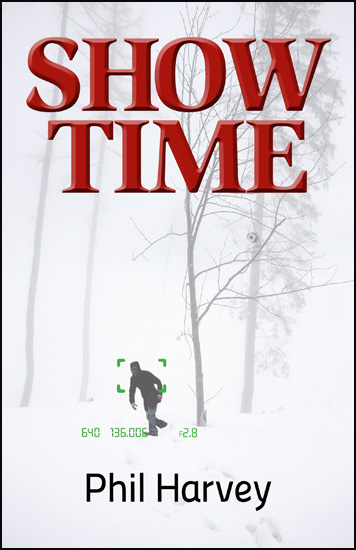18+ Future viewing audiences have become totally desensitized to violence and entirely dependent on sensation to escape their boring workaday lives—an addiction nurtured by the media with graphic portrayals of war and crime and with so-called reality programming.
Future viewing audiences have become totally desensitized to violence and entirely dependent on sensation to escape their boring workaday lives—an addiction nurtured by the media with graphic portrayals of war and crime and with so-called reality programming.
Now, TV execs in pursuit of the only things they care about—higher ratings and bigger paychecks—have created the ultimate reality show: Seven people, each bearing the scars of his or her past, are deposited on an island in the middle of Lake Superior.
Given some bare necessities and the promise of $400,000 each if they can endure, the three women and four men risk death by starvation or freezing as the Great Lakes winter approaches. The island is wired for sound, and flying drones provide the video feed, so everything the contestants do and say is broadcast worldwide.
Their seven-month ordeal is entirely unscripted, they can’t ask for help or they forfeit the prize, and as far as the network is concerned—the fewer survivors the better.
EXCERPT
Day 198
THE SNOW WAS DEEP, drifting and crusting into whorled shapes under the pale sky. The thermometer nailed to the tree at the edge of the camp area read minus 11, inching down toward the minus-40 line where Fahrenheit and Celsius were equal. Ambrose had a bet with himself that it wouldn’t go that far.
He puffed his breath out, watched the faint cloud quickly disappear in the dry Lake Superior air. I’m going to do it today, he thought. I’m going to start today. The time has come.
He walked carefully to the tree where three wood saws hung, and selected the smallest, a band-type saw with an eighteen-inch blade stretched between the ends of a bowed metal tube. The teeth of the saw were deeply serrated, worn from cutting wood, hundreds of small logs and sticks that had kept them from freezing. He tested the teeth. For all the work they had performed, they remained remarkably sharp. This saw would do, this saw and his hunting knife.
He checked the leg pocket of his pants for the waterproof match container. In the same pocket there were three fire-starter pellets. No shortage of those.
As Ambrose left the clearing, Maureen and Ashai looked up. Ambrose flipped his fingers in a little wave. Ashai nodded back. Maureen looked at him for a moment and then went back to the tedious job of softening boiled lichen with her teeth. It was all they’d had to eat for five days.
Ambrose walked slowly and with great care along the trail to Rudy’s camp, the little saw hanging heavy in his hand. As he walked, his eyes darted from side to side, alert for a rabbit or a vole or perhaps even a fox, but there was no sign of edible life, only fir trees and yew bushes.
Ambrose had been hungry before. He had gone without food for three days on a camping trip in Manitoba. It had not been pleasant, but at the end of the third day they had arrived back at their truck and driven straight to an all-night diner at the intersection of Route 124 and old route 42 where their hunger was soon sated with pancakes and maple syrup.
Here, it had settled into a rhythm. When he woke in the middle of the night, and again in the morning, well before dawn, there was an empty feeling in his stomach, an urgent pull, a void. He knew the feeling would come, and he was afraid of it. Usually, it went away for a few hours during the daylight. Then it came back.
Sometimes, with the others, Ambrose drank hot water just to have some feeling in his belly, but the water didn’t make the empty feeling go away. From the dreaded gnawing, it would progress to a sense of weakness. At the really bad moments, when he sat or lay in the darkness, he could feel his strength draining from his extremities toward the center of his body, a sense that his vital parts were demanding nourishment, and his blood was pulling his energy inward like a turtle retracting its head and legs.
At those moments, Ambrose felt himself becoming weaker and, truly, when he stood up afterward he felt as though his body would not do what he asked, chop wood or walk far. At such moments there was no question of returning to the den he shared with Cecily. He sat down or lay back and hoped for that terrible draining, weakening sensation to go away.
It didn’t take long to reach the clearing on the north shore. What was left of Rudy’s shelter was barely visible under the deep snow, but it was enough to mark the shallow grave where they had left Rudy’s body two months before.
Ambrose went to work. Under a stiff, frozen tarpaulin and a few inches of frozen dirt lay a hundred pounds of frozen meat. It was time.
There was a layer of fresh powder and then a crust, but the crust was thin and Ambrose broke it with his boot heel, quickly uncovering Rudy’s grave. The blue tarp just showed through the dirt. They had dumped enough soil on top of the tarp so the foxes and raccoons wouldn’t find it interesting. With the body frozen, there would be no smell. On that, at least, they had been right. There was no sign of animal digging.
Ambrose pushed the soil back with his gloved hands, standing from time to time to kick at a heavy frozen clod with his boots, then working again on his knees until the blue tarp over Rudy’s body was uncovered. He tugged at the corners of the tarp near where he knew Rudy’s head would be. It took some more kicking and digging until the corners came free. Then he pulled the tarp back slowly, one corner, then the other. There was Rudy. Frozen solid. His once-dark face was nearly white, ashen. One hand stuck off awkwardly to the side, the head turned back in the direction of the main camp.
Ambrose slid his hunting knife carefully out of its sheath and slowly, fearfully, began cutting the back of Rudy’s parka pants.
***
“Do you think they’ll do it?” Janice McNeely said. She was staring at the #12 monitor.
Jimmy Asaki looked up. “Yes,” he said. “They’re starving.”
“They’ve uncovered him. Look.”
“I see.”
“If they do it, do you think Bud will air it?”
“Probably.”
“Maybe they’ll keep it away from the open mikes.”
“I don’t think they care about that anymore. I don’t think they care what reaches the open lines. They’re fighting for their lives.”
GoodReads ** Amazon ** Barnes&Noble
About the author:
 Phil Harvey’s fiction has appeared in twenty-two literary magazines, including Phantasmagoria, which nominated one of his stories for a Pushcart Prize, and Antietam Review, which named another the winner of its annual contest. Most recently his work has appeared in The MacGuffin, Natural Bridge, and the Dos Passos Review.
Phil Harvey’s fiction has appeared in twenty-two literary magazines, including Phantasmagoria, which nominated one of his stories for a Pushcart Prize, and Antietam Review, which named another the winner of its annual contest. Most recently his work has appeared in The MacGuffin, Natural Bridge, and the Dos Passos Review.
Harvey’ nonfiction includes: Let Every Child Be Wanted, which drew praise from former President Jimmy Carter; Government Creep, which, as one reviewer noted, “proves that government has invaded virtually every nook and cranny of our lives,” and The Government vs. Erotica, which Publishers Weekly and Booklist praised, the ALA Intellectual Freedom Roundtable nominated as the year’s best book on intellectual freedom, and Media Coalition called “a frightening, enlightening story.”
By day, Phil Harvey is president of DKT International, a non-profit family planning and AIDS prevention organization, and president and majority shareholder of Adam & Eve, a mail-order business that sells sexually oriented books and films.
He lives with his wife, Harriet Lesser, in Cabin John, Maryland. He is stepfather and grandfather to several very promising kids. He welcomes emails from readers who have serious and thoughtful questions about any of his stories, novels or books.




No comments:
Post a Comment